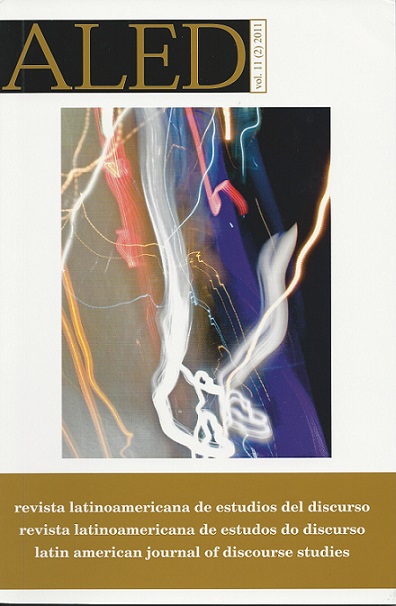Las inocentes preguntas sobre el significado durante los testimonios
Keywords:
discursive strategy. evaluation. questions. courtroom.Abstract
From the perspective of situated discourse analysis and, in particular, from the point of view of theories that analyze institutional and workplace discourse (Drew and Heritage, 1992; Sarangi and Roberts, 1999), this article examines a discursive strategy used by trial lawyers during the evidential part of a criminal trial. The data come from the official records of interactions between lay witnesses and trial lawyers during direct and cross-examinations in a trial that took place in the US in 2002. The strategy described includes the use of questions about the meaning of particular everyday expressions. The implicit evaluation is generated through the apparent attention drawn to the meaning of the expressions and through the sequential location of the questions. The analysis reveals that the function of this strategy is to covertly discredit witnesses of the other side.
Downloads
References
ANTAKI, C. (2002). ‘Personalized revision of “failed” questions’, Discourse Studies 4 (4): 411-428.
CARRANZA, I. E. (2003). ‘Genre and institution: Narrative temporality in final arguments’, Narrative Inquiry 13 (1): 41-69.
CARRANZA, I. E. (2004). ‘Discourse markers in the construction of the text, the activity, and the social relations: Evidence from courtroom discourse’, en R. Márquez, & M. E. Placencia (Comp.) Current trends in the pragmatics of Spanish, pp. 203-227. Amsterdam/Nueva York: John Benjamins.
CARRANZA, I. E. (2006). ‘Face, social practices, and ideologies in the courtroom’, en M. E. Placencia & C. García (Eds.) Research on politeness in the Spanishspeaking world, pp: 163-187. Mahwah (N.J.): Lawrence Erlbaum.
CARRANZA, I. E. (2008). ‘Metapragmatics in a courtroom genre’, Pragmatics, 18 (2): 169-188.
CARRANZA, I. E. (2010). ‘La escenificación del conocimiento oficial’, Discurso & Sociedad, 4 (1): 1-29.
CARRANZA, I. E., ROSENBAUN, M. L. & BARRERAS, C. (2001). ‘Intertextualidad en la incorporación de declaraciones por su lectura’, en C. Lista, M. I. Bergoglio & M. Díaz de Landa, (Eds.) Cambio social y derecho: Debates y propuestas sociológicas en los inicios del siglo XXI, pp. 579-585. Córdoba: Editorial Triunfar.
CONLEY, J. M. & O’BARR, W. (1998). Just words. Law, language, and power. Chicago/Londres: The University of Chicago Press.
COTTERILL, J. (2003). Language and power in court. A linguistic analysis of the O.J. Simpson trial. Nueva York: Palgrave/MacMillan.
DREW, P. & HERITAGE, J. (Eds.) (1992). Talk at work: Interaction in institutional settings. Cambridge: Cambridge University Press.
DREW, P. (1992). ‘Contested evidence in cross-examination’, en P. Drew, & J. Heritage, (Eds.) Talk at work. Interaction in institutional settings, pp: 470-520. Cambridge: Cambridge University Press.
EADES, D. (2006). ‘Lexical struggle in court: Aboriginal Australians versus the state’. Journal of Sociolinguistics, 10 (2): 153-180.
EHRLICH, S. (1998). ‘The discursive reconstruction of sexual consent’, Discourse & Society, 9 (2): 149-171.
EHRLICH, S. (2001). Representing rape. Language and sexual consent. Londres/Nueva York: Routledge.
GRICE, P. (1989). Studies in the way of words. Cambridge (Mass.): Harvard University Press.
HARRIS, S. (1994). ‘Ideological exchanges in British magistrate courts’, en J. Gibbons, (Ed) Language and the law, pp. 156-170. Londres/Nueva York: Longman.
HEFFER, C. (2005). The language of jury trial. A corpus aided analysis of legal-lay discourse. Londres: Palgrave.
KOSHIK, I. (2003). ‘Wh-questions used as challenges’, Discourse Studies, 5 (1): 51-77.
MATOESIAN, G. (1993). Reproducing rape. Domination through talk in the courtroom. Chicago: University of Chicago Press.
MATOESIAN, G. (2001). Law and the language of identity: Discourse in the William Kennedy Smith rape trial. Oxford: Oxford University Press.
SARANGI, S. & ROBERTS, C. (1999). Talk, work and institutional order. Nueva York: Mouton de Gruyter.
SCHIFFRIN, D. (1994). Approaches to discourse. Cambridge (Mass.): Blackwell.
SEARLE, J. R. (1969). Speech acts. Cambridge: Cambridge University Press.
STYGALL, G. (2001). ‘A different class of witness: Experts in the courtroom’, Discourse Studies, 3 (3): 327-349.
Downloads
Published
How to Cite
Issue
Section
License

This work is licensed under a Creative Commons Attribution-NonCommercial-NoDerivatives 4.0 International License.
The authors retain the copyright and guarantee RALED the right to be the first publication of the work as well as a Creative Commons Attribution License that allows others to share the work with recognition of authorship and the initial publication in this journal.




